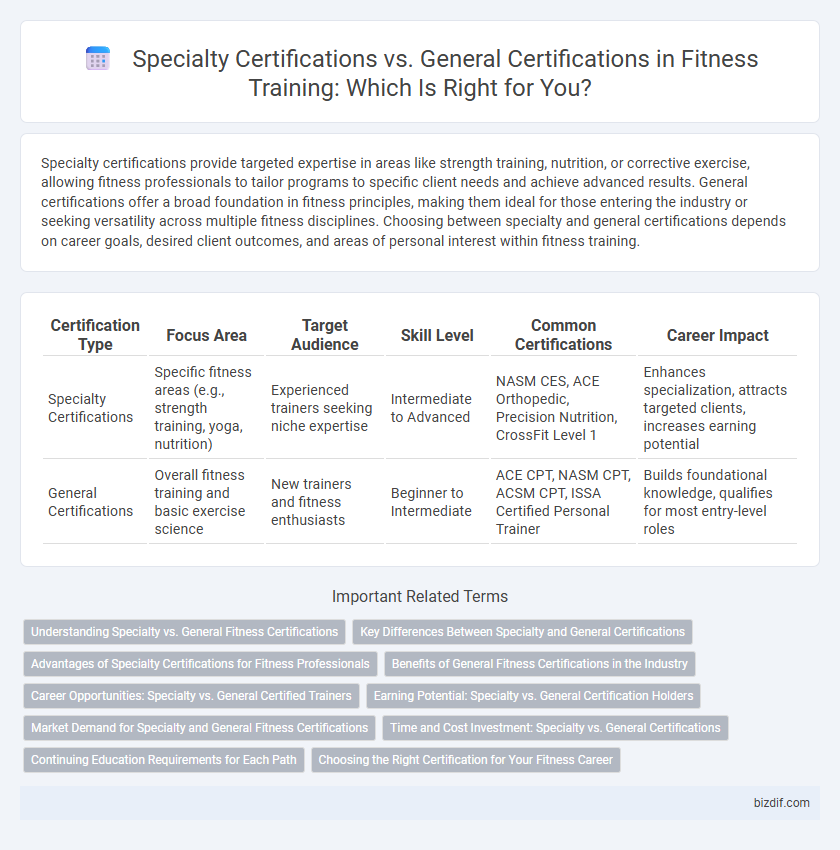Specialty certifications provide targeted expertise in areas like strength training, nutrition, or corrective exercise, allowing fitness professionals to tailor programs to specific client needs and achieve advanced results. General certifications offer a broad foundation in fitness principles, making them ideal for those entering the industry or seeking versatility across multiple fitness disciplines. Choosing between specialty and general certifications depends on career goals, desired client outcomes, and areas of personal interest within fitness training.
Table of Comparison
| Certification Type | Focus Area | Target Audience | Skill Level | Common Certifications | Career Impact |
|---|---|---|---|---|---|
| Specialty Certifications | Specific fitness areas (e.g., strength training, yoga, nutrition) | Experienced trainers seeking niche expertise | Intermediate to Advanced | NASM CES, ACE Orthopedic, Precision Nutrition, CrossFit Level 1 | Enhances specialization, attracts targeted clients, increases earning potential |
| General Certifications | Overall fitness training and basic exercise science | New trainers and fitness enthusiasts | Beginner to Intermediate | ACE CPT, NASM CPT, ACSM CPT, ISSA Certified Personal Trainer | Builds foundational knowledge, qualifies for most entry-level roles |
Understanding Specialty vs. General Fitness Certifications
Specialty fitness certifications focus on specific training areas such as strength conditioning, corrective exercise, or nutrition coaching, providing targeted expertise for niche client needs. General fitness certifications offer broad foundational knowledge in exercise science, program design, and client assessment, suitable for entry-level trainers working with diverse populations. Understanding the distinct scope and application of each certification helps fitness professionals tailor their qualifications to career goals and client demands.
Key Differences Between Specialty and General Certifications
Specialty certifications in fitness training target specific areas such as strength conditioning, yoga, or nutrition, providing in-depth expertise and advanced skills for niche markets. General certifications offer broad foundational knowledge applicable to overall fitness training, suitable for personal trainers working with diverse client populations. Key differences include the depth of subject matter, targeted client demographics, and the potential for higher earning in specialized fields versus versatility in general training roles.
Advantages of Specialty Certifications for Fitness Professionals
Specialty certifications offer fitness professionals targeted expertise in areas such as strength training, group fitness, or corrective exercise, enhancing their ability to tailor programs to specific client needs. These certifications increase marketability by showcasing advanced knowledge and skills in niche areas, often leading to higher client trust and better job opportunities. Moreover, specialty certifications can improve client outcomes through specialized techniques and evidence-based practices, setting professionals apart in a competitive fitness industry.
Benefits of General Fitness Certifications in the Industry
General fitness certifications provide a broad foundation in exercise science, nutrition, and client assessment, making them highly versatile for various fitness careers. These certifications are widely recognized by employers and clients, enhancing credibility and job opportunities across gyms, wellness centers, and corporate fitness programs. Their comprehensive curriculum equips trainers with adaptable skills, facilitating continuous professional growth and the ability to work with diverse populations.
Career Opportunities: Specialty vs. General Certified Trainers
Specialty certifications in fitness training, such as strength conditioning or corrective exercise, offer targeted expertise that attracts niche clientele and opens opportunities in specialized facilities. General certifications provide broad foundational knowledge, allowing trainers to work in diverse settings like gyms and community centers, enhancing job flexibility. Career advancement often depends on combining both specialty and general certifications to meet industry demands and increase marketability.
Earning Potential: Specialty vs. General Certification Holders
Specialty certifications in fitness training often lead to higher earning potential by targeting niche markets such as prenatal, strength conditioning, or youth fitness, which command premium rates. General certification holders typically access a broader client base but may experience lower average salaries due to less specialized expertise. Data from the International Health, Racquet & Sportsclub Association (IHRSA) shows specialty-certified trainers earn up to 20% more annually compared to their general-certified counterparts.
Market Demand for Specialty and General Fitness Certifications
Specialty fitness certifications, such as those focusing on strength training or corrective exercise, meet the growing market demand for targeted expertise and cater to niche client needs. General fitness certifications provide foundational knowledge essential for broad-spectrum personal training, appealing to entry-level professionals seeking versatile job opportunities. The fitness industry increasingly values specialty certifications due to rising consumer interest in personalized and scientifically backed training programs.
Time and Cost Investment: Specialty vs. General Certifications
Specialty certifications in fitness training often require a higher time and financial investment due to their focused curriculum and advanced content. In contrast, general certifications typically demand less time and lower costs, making them more accessible for beginners. Choosing between them depends on the desired expertise level and career goals within the fitness industry.
Continuing Education Requirements for Each Path
Specialty certifications in fitness training demand targeted continuing education units (CEUs) focused on specific skills such as strength conditioning or corrective exercise, ensuring professionals maintain advanced expertise. General certifications require broader CEUs covering fundamental fitness principles, safety protocols, and client management to uphold a wide-ranging knowledge base. Both paths mandate consistent education, but specialty certifications often involve more frequent and specialized updates to keep pace with evolving scientific research and industry standards.
Choosing the Right Certification for Your Fitness Career
Specialty certifications in fitness training, such as strength conditioning or yoga instruction, provide targeted expertise that can attract niche clients and enhance career opportunities in specific areas. General certifications, like ACE or NASM, offer broad foundational knowledge suitable for working with a wide range of clients and settings. Choosing the right certification depends on your career goals, preferred client demographics, and desired specialization within the fitness industry.
Specialty certifications vs General certifications Infographic

 bizdif.com
bizdif.com